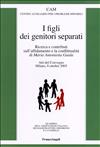
LIBRI DI PAOLA RONFANI
La ricerca ha estratto dal catalogo 27 titoli



Nell’articolo si esamina e si discute l’approccio sociologico al diritto che Jacques Commaille espone nel suo recente libro À quoi nous sert le droit. L’autore si prefigge, da un lato, di rinnovare il legame con le grandi tradizioni sociologiche che consideravano il diritto come lo strumento privilegiato per spiegare l’organizzazione delle società e, dall’altro lato, di stimolare una visione interdisciplinare, attraverso la collaborazione fra scienziati sociali e giuristi, da lui ritenuta indispensabile per comprendere i mutamenti del diritto nelle società contemporanee. Più specificamente, con grande apertura a differenti paradigmi interpretativi, elabora uno specifico quadro analitico, che pone in primo piano la connessione fra il diritto e la politica: la legalità duale e le sue due facce del droit référence e del droit ressource. Esprime anche la convinzione che il diritto sia anche una indispensabile risorsa per opporre resistenza all’affermarsi di una nuova razionalità giuridica tecnico-gestionale e promuovere i diritti delle minoranze e dei soggetti più vulnerabili.

Nel saggio si presentano le questioni oggi più ricorrenti nel dibattito sui diritti dei minori con riferimento alla letteratura di carattere interdisciplinare, sociologicogiuridica, sociologica e filosofica e prestando specifica attenzione a recenti lavori di autori italiani. Alcune questioni riprendono temi che già caratterizzavano le riflessioni degli studiosi all’indomani dell’approvazione della Convenzione ONU del 1989, in particolare per ciò che concerne l’appropriatezza per i bambini del linguaggio dei diritti. Altre sono incentrate su nuove prospettive quali l’agentività dei bambini, le loro competenze cognitive e morali, la loro responsabilità individuale e sociale, nonché la funzione latente di controllo sociale che verrebbe assolta dai diritti dei bambini. Si sottolineano anche gli stretti rapporti che esistono, politicamente, culturalmente e nella pratica, fra tali diritti e lo sviluppo della sociologia dell’infanzia.

Nella cultura giuridica, così come nei saperi esperti, in particolare quelli sociologico e psicologico, il dibattito internazionale sulla violenza, fisica e psicologica, dei genitori verso i figli ha raggiunto dimensioni ragguardevoli e si esprime in una vasta gamma di opinioni, valutazioni e proposte di programmi di intervento nei confronti delle vittime e dei perpetratori delle violenze. Nell’articolo, in cui si ripercorre tale dibattito facendo ampio riferimento alla letteratura straniera, si evidenzia come nella cultura giuridica vi sia una buona condivisione di orientamenti circa l’esigenza che il diritto proibisca espressamente ai genitori di sottoporre a trattamenti umilianti e degradanti i figli nell’esercizio delle loro funzione di cura ed educativa. Al contrario, nei saperi esperti gli orientamenti appaiono più problematici e controversi per ciò che concerne sia l’ambito semantico del concetto di violenza familiare, sia la comprensione dei fattori sociali e culturali alla base dei comportamenti violenti dei genitori verso i figli. Questa disparità di opinioni si riflette, sul piano pratico, nelle scelte dei possibili modelli di trattamento e di contrasto (politico- sociale, amministrativo, giudiziario) di tali comportamenti. Nel lavoro si sottolinea, in particolare, l’esigenza di non trascurare la correlazione, che emerge da numerose ricerche empiriche, fra disorganizzazione e vulnerabilità sociali ed esercizio della responsabilità genitoriale considerato moralmente inadeguato.


Responsabilità genitoriale - Diritto europeo - Cultura giuridica - Politiche sociali - Pratiche familiari. Già da alcuni anni, nell'ambito del processo di integrazione europea, è in corso il tentativo di armonizzare la regolazione giuridica delle relazioni familiari. Fra i principi unificanti delle varie legislazioni ha assunto una posizione privilegiata il concetto di responsabilità genitoriale, che è molto complesso e, sotto alcuni aspetti, anche ambiguo se si riflette, come si cerca di fare nell’articolo, sulle diverse implicazioni che questa nozione ha con saperi diversi da quello giuridico (filosofia, morale, psicologia, sociologia, scienza dell’educazione). In particolare, si evidenzia come nelle rappresentazioni oggi più accreditate della responsabilità dei genitori abbia assunto un’importanza rilevante la dimensione della cura e si analizza, in prospettiva critica, la convinzione che si è andata diffondendo nell’ambito delle scienze sociali e politiche, e che è stata recepita nelle azioni di gran parte dei governi, che l’indebolimento del legame sociale sia primieramente imputabile ad una insufficiente assunzione di responsabilità dei genitori nei loro compiti educativi e disciplinari verso i figli. La responsabilità genitoriale viene esaminata anche nella sua dimensione di pratica sociale che si presta ad essere considerata come un esempio emblematico del "diritto vivente". Sotto quest'aspetto, assumono un rilievo particolare le forme di genitorialità, sociali o addizionali, delle famiglie ricomposte e omogenitoriali, che pongono i legislatori dinnanzi a domande che toccano lo statuto della filiazione.


I luoghi neutri nei servizi sociali: riflessioni e pratiche a confronto
Una selezione dei numerosi argomenti legati alle pratiche di Luogo neutro per la realizzazione del diritto al mantenimento delle relazioni familiari tra genitori e figli. Il testo presenta contributi di carattere sociologico, psicologico, giuridico, formativo e del servizio sociale, al fine di offrire un quadro che permetta di apprezzare la varietà e la complessità delle nuove forme di intervento nell’ambito delle relazioni familiari.
cod. 1130.229

The Right to Reconcile Family Life and Work: A Case Study of How Individual Freedom Relates to Social Expectations ABSTRACT: In Italy, the right to reconcile one’s professional life with one’s family life was declared in 2000, in a very sweeping and detailed law (N° 53) that comes under the heading of the social policies sustained for some time by the European institutions, whose aim is to enact a series of measures, including paternity leave, to achieve a better balanced participation of women and men, both in the working world and in the activities involved in caring for the family. As it is cited in European document mission statements in particular, the right of reconciliation is dual in nature: it is both a social right and an individual right of freedom, as its application ought to enable women and men to live out their personal relationships in both their public and their private lives. Moreover, insofar as it concerns the relations between social caregivers and social beneficiaries (between parents and their children, for example, but also the older or disabled members of the family), it can also be included under the heading of rights of relationship. The article underscores the almost magical nature of the right of reconciliation, which aims to cater for a very wide range of very different expectations, highlighting the risk that it may be used to transform social problems into individualised legal problems. Specific attention is then paid to its subjective dimension, as a right in everyday life, when elements of conflict become relevant, as its enactment calls for a rather radical redefinition of gender roles in housework and in caring.



Ricerca e contributi sull'affidamento e la conflittualità. Atti del Convegno Milano, 8 ottobre 2005
cod. 1268.4

In the latest literature, the extensive catalogue of subjective rights has been enriched with a new category, that of the Relational Rights, or Rights of Relation. These rights are mentioned with regard to specific groups, in particular the family, but some authors mention them with regard to every context where interpersonal relationships are developed. It follows that fundamental rights should also be construed as relational rights. The article expounds on the distinctive traits of this category of rights, which has been elaborated primarily by scholars with a feminist orientation in the framework of their work about the ethics of care, then analyses the premises underlying the perspective of relational rights, highlighting in particular their connections with the critique of the individualistic basis of human rights. The author also stresses that this perspective clashes significantly with such doctrines as solidarity and transpersonalism and also with critical thinking about how rights make their way into the vital world. Lastly, she questions the implications of the transposition of relational rights in the framework of the institutional treatment of conflicts, with a specific focus on family and juvenile justice.

Italy’s Family Legislation was rewritten in 1975 as part of a far-reaching reform that introduced principles of family law already accepted by most other European countries: neutrality and respect for the choices of the spouses, who are formally recognised as equal, the individualisation and privatisation of family relations and the central importance of the interests of children. Since then, sporadic legislation has been introduced to deal with individual subjects, such as adoption and divorce. Unlike what has happened in other European countries, however, the knottiest problems arising from the principles mentioned above have not yet been faced, primarily the ones related to guaranteeing the rights of individual members of the family and to the continuity of relations between children and their parents. One typical trait of Italy’s legal culture in this regard is the paternalistic model often found in the civil law countries in the Mediterranean area, where the judge functions pro-actively to adjust family relations, although this approach has now also been joined by others that tend more to underline the independence of the individual members of the family and their individual rights. Legislation dealing with other problems of some importance, such as rules governing cohabitation, homosexual unions and artificial reproduction, is notable for its complete absence. In addition to this, the further reform of the system of Family Justice, which has been under debate since the introduction of 1975 Reform, is still awaiting approval. All these problems are the subject of a number of legislative proposals considered in the note that also discusses the reasons for this legislative stalemate.

The United Nations Convention on the Rights of the Child and the European Convention on the Exercise of Children’s Rights have obliged legal culture concerned with minors and the family in various countries to face up to numerous problems related to their implementation. One crucial problem concerns balancing the conventional perspective of the superior interest, which hinges on the concept of protection, against the innovative perspective of the fundamental rights of the child, in particular of rights of freedom, which focuses on autonomy. In turn, these perspectives illustrate different images of infancy: from infancy projected into the future, according to the model characteristic of modernism, to the emancipated image of infancy on the road to adulthood as perceived by theorists of liberation, and to the late modern image of infancy that is still awaiting ultimate definition, which is used to express not only the more general trend towards the confirmation of individualism, but also - at least in the interpretation given to it by some authors - nostalgia for the loss of social identity. The article sets out to highlight how these images are reflected in legal culture, in particular underlining a new perspective now in the process of taking shape, which, in an attempt to reconcile a moderately paternalistic orientation with the recognition of autonomy, stresses both a new concept of protection as an expression of social rights and the importance of minors taking part in the decision-making processes themselves. The Italian government’s reports on the United Nations Convention presented to the Children’s Rights Committee and the Progress Report on Law 285/97 are then also used in an attempt to illustrate how these problems come to expression in Italian legal culture, which is still manifestly hesitant about flanking steps taken by way of protection with the proposal and enforcement of any steps designed to guarantee minors’ rights of freedom.

cod. 1525.36


